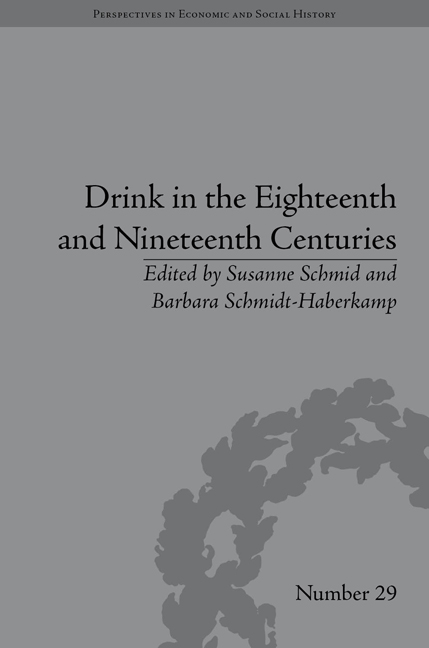Book contents
- Frontmatter
- CONTENTS
- Acknowledgements
- List of Contributors
- List of Figures and Tables
- Introduction
- Part I Ritual and Material Culture
- Part II Institutions and Social Class
- Part III Temperance and the Misery of Alcohol
- Part IV Intoxication and Therapy
- Part V Case Studies: Rum, Cocoa and Magical Potions
- Notes
- Index
Introduction
- Frontmatter
- CONTENTS
- Acknowledgements
- List of Contributors
- List of Figures and Tables
- Introduction
- Part I Ritual and Material Culture
- Part II Institutions and Social Class
- Part III Temperance and the Misery of Alcohol
- Part IV Intoxication and Therapy
- Part V Case Studies: Rum, Cocoa and Magical Potions
- Notes
- Index
Summary
His [the farmer's] honest Friends, at thirsty hour of Dusk,
Come uninvited; he with bounteous Hand
Imparts his smoaking Vintage, sweet Reward
Of his own Industry; the well fraught Bowl
Circles incessant.
John Philips, Cyder (1708)John Philips's Cyder: A Poem in Two Books (1708) teaches the reader in great detail not only how to produce superior cider but also how to enjoy this ‘home-brew’ in an atmosphere of rural conviviality. His two-part georgic, 1,465 lines long, ranges from a description of the rural year's cycle to digressions about British history. Cyder, published one year after the Act of Union (1707), is more than a recipe in rhyme about a fermented drink made from apples: it constitutes a symbolic celebration of a united England and Scotland – thus drinking cider, and writing about it, become national statements.
Cider, rum, wine, beer, coffee, tea, cocoa, even water, are all forms of liquid refreshment and nourishment, and their consumption signals individual preferences; yet they are also emblems of lifestyles, of political affiliations, even of religious creeds. Eighteenth- and nineteenth-century drink was coded in terms of nationality, class and gender. If, in the early eighteenth century, cider came to be seen as English, rural and masculine, chocolate, on the other hand, occasionally mentioned in contemporary debates around luxury, was regarded as an aphrodisiac, as urban and later as a comforting drink particularly suited to female needs.
- Type
- Chapter
- Information
- Drink in the Eighteenth and Nineteenth Centuries , pp. 1 - 10Publisher: Pickering & ChattoFirst published in: 2014



